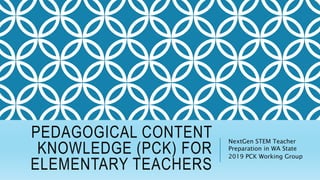
PCK for Elementary Teachers in Science.pptx
- 1. PEDAGOGICAL CONTENT KNOWLEDGE (PCK) FOR ELEMENTARY TEACHERS NextGen STEM Teacher Preparation in WA State 2019 PCK Working Group
- 2. WHAT IS PCK ALL ABOUT? PCK is how you represent subject matter to students PCK is ideas about students’ conceptions and misconceptions PCK is understanding topic-specific learning difficulties students may have Shulman, 1986
- 3. PCK COMPONENTS FOR TEACHING ELEMENTARY SCIENCE (SMITH, 2000) Knowledge of children’s ideas and the usual barriers they encounter in understanding conceptual content Knowledge of strategies that facilitate learning for girls, minorities, ELLs, and students with special needs Understanding of the role of representations, examples, and metaphors in facilitating children’s understanding Knowledge of teachers’ orientations toward teaching science (syntactical knowledge)
- 4. PCK FROM A CONSTRUCTIVIST PERSPECTIVE (COCHRAN ET AL, 1993) Knowledge of students Knowledge of environmental contexts Knowledge of pedagogy Knowledge of subject matter
- 5. PCK FOR TEACHING PRESERVICE TEACHERS (SMITH, 2000) Knowledge of students’ experiences as science learners Students’ assumptions about scientists and their work Students’ ideas about what learning to teach science ought to involve
- 6. PCK HAS A HIERARCHY, FOR EXAMPLE IN SCIENCE 1. Science PCK 2. Specific discipline PCK (e.g. – physics v. chemistry) 3. Specific topic within a discipline PCK (e.g. – electric circuits)
- 7. BUT WHAT ABOUT ELEMENTARY TEACHERS PCK? Elementary teachers work with specific topic PCK Elementary teachers rarely develop specific discipline PCK Elementary teachers tend to have limited knowledge in both science content knowledge and science PCK Appleton, 2008
- 8. ELEMENTARY TEACHERS’ FOUNDATION FOR PCK 1. Substantive content knowledge Children’s naïve ideas Teaching strategies Curriculum repertoire Content representation 2. Syntactical content knowledge Orientation to teaching science/technology/engineering/math 3. STEM experiences Views of science, technology, engineering, math Views of STEM learners Views of STEM teaching
- 9. TWO LEVELS OF PCK 1. Espoused/planned PCK (the type of knowledge needed for planning instruction) 2. Enacted PCK (what a teacher does in the classroom in response to the students’ learning needs)
- 10. RESOURCES Appleton, K. (2008). Developing science pedagogical content knowledge through mentoring elementary teachers. Journal of Science Teacher Education, 19, 523-545. Cochran, K. F., DeRuiter, J. A., & King, R. A. (1993). Pedagogical content knowing: An integrative model for teacher preparation. Journal of teacher Education, 44(4), 263-272. Shulman, L. S. (1986). Those who understand: Knowledge growth in teaching. Educational researcher, 15(2), 4-14. Smith, D. C. (2000). Content and pedagogical content knowledge for elementary science teacher educators: Knowing our students. Journal of Science Teacher Education, 11(1), 27-46.